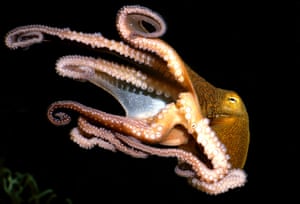It’s not every poet who manages to work a demanding day job as a Met Office climate scientist. But when Rachel McCarthy isn’t walking the corridors of Whitehall, on secondment to the Department of Energy and Climate Change, she is to be found polishing her poems.
Despite achieving a double first in physics and chemistry, McCarthy always wanted to write. As the founder of Excite Poetry, the Devon wing of the Poetry Society, and the director of the sell-out Exeter poetry festival, her verse-writing skills are matched only by her ability to draw crowds to big events.
Strolling through Exeter’s arty West Quarter, blinded by a low winter sun, McCarthy ducks into her favourite junk shop, Otto Retro. “I used to run this open-mic night here,” she says, eyeing up the curiosities that include an Austrian zoological chart and some Czech apothecary jars. “It was such a warm environment. We’d have poetry readings – and people could shop during the break.”
In 2015, the British poet laureate Carol Ann Duffy named McCarthy one of the country’s most exciting new voices, describing her work as bold and mesmerising. Last year also saw the publication of Element, under the Laureate’s Choice imprint, curated by Duffy.
Each of the 19 poems in the volume was inspired by elements from the periodic table, which McCarthy is adamant shouldn’t be dismissed as “a thing stuck on the wall in your GCSE class that you had to memorise”. Everything is made of elements, she says. “You and I. This table. It’s an alphabet of our existence.”
The collection spans history and tackles subjects from bees (chromium) and butterflies (iridium) to love (yttrium), disaster (osmium) and art history (zinc), via unsung aircraft fitters such as her own father (titanium). Short notes at the end of the booklet explain the significance of each poem’s element. Copper in octopus blood, for example, carries oxygen more efficiently than iron in haemoglobin, helping the octopus survive deep under water. The poet Alice Oswald says of McCarthy’s writing: “strong interesting poems, full of tension and symmetry. They are alive.”
As you might expect of a scientist, McCarthy did a great deal of research, not only reading “hardcore” chemistry books, but also biographies of Dmitri Mendeleev, who first published the periodic table in 1869, and histories of Russia from the same period. “I became fascinated,not with melting points and boiling points, but with the lives behind the elements. Why they were named as they were – after brothers, wives, stuff in the night sky – and what did they do?” There have even been fraudulent discoveries of fabricated elements.
This week, McCarthy will share this knowledge in Alphabet of Our Universe, part social history lecture, part poetry reading, at Oxford University’s Museum of the History of Science. She says her dual career is often met with surprise, but the two jobs have much in common. “They’re both searching for insight into laws and ideas through particulars. They’re focused on the minutiae.”
In poetry, those particulars are “words, emotions, ideas and metaphors”, but the best poetry is universal, McCarthy says. “Artistic expression is a search for a truth that looks different on the outside. It’s more concerned with human emotions or experience, but they’re still searching.” Unlike poetry, however, science should be morally neutral, since “that sort of protects science from us as human beings”.

Facebook Twitter Pinterest
At school in Leyland, near Preston in Lancashire, McCarthy took six A-levels, including all the sciences, maths and English literature. “I had a fantastic English teacher and there was a point when I wondered, ‘Which road do I go down?’ Because that’s the choice you’re presented with now. We’ve lost the renaissance person.” In the end, she decided she could write in her own time, whereas moonlighting as a scientist was less realistic.
McCarthy feels strongly that art, when tackling scientific subjects, should respect the facts. “If you are influencing the public about a scientific issue, there has to be some responsibility taken by the artist.” Equally, science has a responsibility to artists to properly communicate its findings. Scientific knowledge, McCarthy insists, needn’t dampen one’s wonder at the universe. If anything, it enhances it.
As an example, she riffs on a quote by the American scientist Richard P Feynman printed in the opening pages of Element: “Jupiter, as a mythological figure, to my mind is equally as important as Jupiter the planet. We must engage with both of them.”
• Alphabet of Our Universe is at the Museum of the History of Science, Oxford, on 12 January. Element is published by Smith Doorstop, £7.50.

